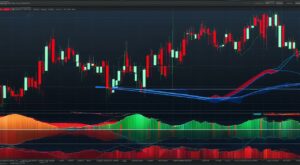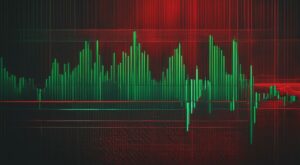Your cart is currently empty!
What Is Islamic Perspective on Forex leverage? See The Truth

Affiliate Disclaimer: This post may contain affiliate link or links
Forex or foreign exchange market is the world’s largest financial market where currency pairs are traded. One key feature that sets Forex apart from other markets is the use of “Forex leverage”.
Islamic perspective on forex leverage is controlversial because some agree that forex leverage is haram while others still hold on to fair usage of forex leverage as not haram. Islam stand against Riba which means interest.
Contents
But where does Islamic finance stand in regard to this?
This article aims to deliver an in-depth analysis of the Islamic perspective on Forex leverage, touching on critical aspects like Sharia compliance, halal investing, the prohibition of riba, and more.

Islamic Perspective on Forex Leverage
Forex leverage, from an Islamic perspective, is a contentious topic due to the involvement of interest, or riba, which is strictly prohibited.
Currency exchange in Islam is permissible if it is done hand-to-hand without delay, which is often not the case with leveraged transactions.
Leverage also involves a degree of uncertainty, or gharar, and gambling, qimar, which are both discouraged in Islamic finance principles.
As a result, forex leverage may not align with the ethical guidelines of Islamic law unless it adheres to specific criteria that avoid these prohibited elements.
The table below shows some helpful guidelines on the Islamic Perspective on Forex Leverage.
| Types of HaramExplanationRelation to Forex Trading | ||
|---|---|---|
| Riba (Interest) | Earning or paying interest is forbidden in Islam | Interest can be incurred in Forex trading through overnight positions known as swaps. |
| Gharar (Uncertainty) | Gharar refers to excessive uncertainty or ambiguity in a contract | Involves unclear terms, lack of transparency or deceptive practices in Forex Trading. |
| Maysir (Gambling) | Maysir essentially refers to gambling, which is prohibited | Overleveraging or trading without proper knowledge or strategy may involve substantial risks, akin to gambling |
| Short Selling | Selling what one does not own is considered impermissible | In Forex, traders often sell currencies they do not physically own, which is a form of short selling. |
| Trade of Haram Commodities | Trading of commodities that are considered haram is prohibited | If Forex trading involves currencies of countries dealing primarily in haram commodities, it may be considered non-compliant. |
Please note that implying all Forex activities fall into these categories of haram would be inaccurate. Many Forex platforms offer Islamic trading accounts designed to avoid these pitfalls.
The table above outlines potential areas of concern in the context of Forex Trading from an Islamic perspective and should be used as a guideline to avoid non-compliant activities.

Why is Forex not Haram?
Islamic finance is governed by the rules of Sharia law, placing significant emphasis on ethical trading and justice in financial transactions. So where does Forex stand in this context?
Forex, in its nature, conforms to the Islamic principle of trading and currency exchange, making it potentially permissible or halal.
This is because the basic Forex transactions comply with the principles of Bay al-Sarf, an agreement to exchange gold for gold, silver for silver.
And currency for currency, direct hand-to-hand with no delay, which is a permissible transaction in Islamic law. However, it’s crucial to understand that not all Forex transactions can be considered halal.
Forex trading becomes questionable in the eyes of Shariah compliance when it involves certain elements such as Riba (interest), Gharar (uncertainty), and Maysir (gambling).
The table below shows in detail why forex is not haram.
| Reasons | Explanation |
|---|---|
| Currency Exchange | In Islamic law, the exchange of different currencies on the spot is permissible. This is the foundation of Forex trading. |
| Elimination of Riba | The swap-free trading accounts provided by many forex brokers do not incur any interest, which is compliant with the prohibition of Riba (interest) in Islam. |
| Transparency | Forex trading provides transparency which ensures that there is no deception or hidden charges, complying with the prohibition of Gharar (uncertainty) in Islam. |
| No Debt Creation | Forex trading does not involve the creation of debt as the transactions are conducted on the spot, avoiding any form of Riba. |
| Avoidance of Haram activities | Forex does not involve investment in Haram commodities or activities. Traders should, however, be careful about the source of the underlying money and the nature of the currencies being traded. |
| Control over Speculation | While Forex can be speculative, it can be controlled with proper use of stop loss, risk management strategies and avoiding overleveraging. Thus, avoiding Maysir (gambling). |
It’s important to note that navigating Forex trading within the bounds of Islamic finance requires knowledge and caution. Traders should take care to avoid practices that might render their activities as non-compliant.

Is Margin Trading Halal or Haram?
An important question that arises in the context of Islamic Forex trading is whether margin trading is halal or haram.
Margin trading in Forex involves borrowing capital from a broker to open a position that is greater than your account equity. Margin trading is, thus, inherently connected with leverage.
You leverage the borrowed money to control a larger position, thus potentially amplifying your profit and loss.
This seems to intersect with the very core of Islamic banking, Murabaha financing, and ethical trading.
From an Islamic standpoint, the trading of currency is generally permissible (halal), provided it does not lead to Riba (interest), it eliminates Gharar (uncertainty), and it avoids Maysir (gambling).
These principles could be contravened by leveraging in that, if done incorrectly or excessively, it could lead to notable losses, reflecting a form of gambling (maysir).
And the use of borrowed money could unintentionally involve riba.
However, there are Forex brokers that take these considerations into account and offer swap-free accounts that are compliant with Islamic finance principles by eliminating overnight interest.
While this solves part of the problem, it’s necessary for the individual trader to apply risk management strategies and good money management to avoid falling into speculative practices and ensure Sharia compliance.

Why is High Leverage Bad in Forex?
While forex leverage can magnify potential profits, it also magnifies risk, making it a double-edged sword.
High leverage can put the trader’s capital at significant risk because losses can exceed the original investment.
This is known as leverage risk and it increases with the leverage ratio. Moreover, overleveraging may lead to margin calls if market fluctuations go against your position.
Failing to meet margin requirements can result in your position being closed, leading to a full loss of the investment.
High leverage can lead to overleveraging, making it akin to gambling, where the focus is on high return rather than capital preservation.
This violates the principles of Gharar and Maysir, making it impermissible in Islamic finance.

Islamic View on Trading
Islamic finance promotes responsible investing and encourages Muslims to engage in business activities that align with Sharia compliance and ethical trading.
The main principles of Islamic trading include interest-free trading which avoids Riba, eradicating uncertainty (Gharar), and avoiding any form of gambling (Maysir).
This includes a prohibition of investing in businesses that deal with alcohol, pork, gambling, and adult entertainment among other things.
Transparency, due diligence, and contractual obligations are also emphasized in Islamic trading.
The table below shows Islamic view on trading.
| Islamic Principles | Explanation | Application in Trading |
|---|---|---|
| Prohibition of Riba (Interest) | In Islam, charging, and paying interest (riba) is strictly prohibited | Traders should ensure they avoid swap-charges which might involve interest. Many Forex platforms offer ‘Swap-free’ accounts specifically for Muslim traders |
| Avoidance of Gharar (Uncertainty) | Unclear, misleading, or incomplete information is considered “Gharar” and thus, forbidden | Traders ought to carry out due-diligence and ensure the full disclosure and transparency of all transactions |
| Avoidance of Maysir (Gambling) | Speculative trading or gambling is considered “Maysir” in Islam | Employing proper trading strategies, setting limits, and adequate knowledge can avoid speculative practices |
| Ethical Trading | All business activities should uphold ethics and morality | Traders should ensure they don’t engage in manipulative or deceitful trading practices |
| Trading In Halal Products | Trading of Haram commodities like pork, alcohol, etc is prohibited | Customarily not a concern in forex, but should be considered if trading commodity currencies linked to Haram industries |
| No Debt Creation | Trading on borrowed money is considered Haram unless terms meet specific Islamic finance guidelines | Forex traders should avoid creating debt through their transactions and when leveraging trades |
NOTE: It’s important to understand that while the table above addresses the principle of Islamic trading, its practical application in Forex trading can be complex, requiring the guidance of Islamic finance scholars or Sharia-compliance advisory boards.

What is Islamic Forex Trading?
Islamic Forex Trading revolves around religious laws of Islam that determine the conformity of investment with Islamic principles.
Sharia-advisory boards of Islamic banks and forex brokers, ensure that these investment products are Sharia-compliant.
Some of the Islamic principles that need to be considered in foreign exchange trading include prohibition of interest (Riba).
Prohibition of uncertain transactions (Gharar), and contracts should not involve excessive risk and speculation.
Islamic Forex accounts, also known as swap-free accounts, are special trading accounts that do not incur Riba (interest).
These accounts comply fully with Islamic law, which prohibits earning and charging interest on loans.
What is the Safest Leverage in Forex?
To maintain Sharia compliance, the focus in forex trading should be on risk management, rather than leveraging for high returns.
The safest leverage in forex is therefore one that’s in line with one’s risk tolerance and investment objectives which is 1:1.
An important aspect of risk management is position sizing, which is the process of deciding how much of your capital to risk on any single trade.
Diversification, or spreading your investments across different assets, is another essential strategy used to manage risk.

Conclusion
The Islamic perspective on forex leverage is intricate, focusing on ethical trading, capital preservation, and returns optimization.
Forex trading can be aligned with Islamic principles when considerations are given to factors such as Riba prohibition, interest-free trading, risk management, and avoiding speculative trading.
Approaching Forex under the scope of Sharia compliance entails understanding the principles of Islamic finance and applying them diligently.
It involves due diligence, understanding of currency volatility and awareness of regulatory oversight boundaries. Do remember the importance of financial literacy.
Using leverage responsibly, understanding the market dynamics and pairing it with effective money management strategies can create a halal, Sharia-compliant trading environment.
It’s always recommended to work with reputable brokers who provide transparency and follow leverage regulations.
In the quest for halal investing, the investor should understand that Sharia compliance isn’t just about conforming to religious laws.
But it’s also about ethical, responsible actions that can lead to sustainable, long-term profitability.
Free Download PZ Lopez Channel
Other related articles
- Trade Report Indicator: Indicator for Forex Traders
- Trend Profiteer Trading System: A Trader’s Must Have
- Quantum Trend Sniper Indicator MT4: Free Download
- German Sniper Indicator: Unveiling its Power
- Mastering MACD Intraday Trend | Indicator Free Download
- Crazy Accurate 5-Days Breakout Strategy: Unlock Success

Joseph Benson, I have been trading forex for more than 15 years now and I am still trading actively, a content writer, an Architect also SEO expert, learn how to trade easily with me.









